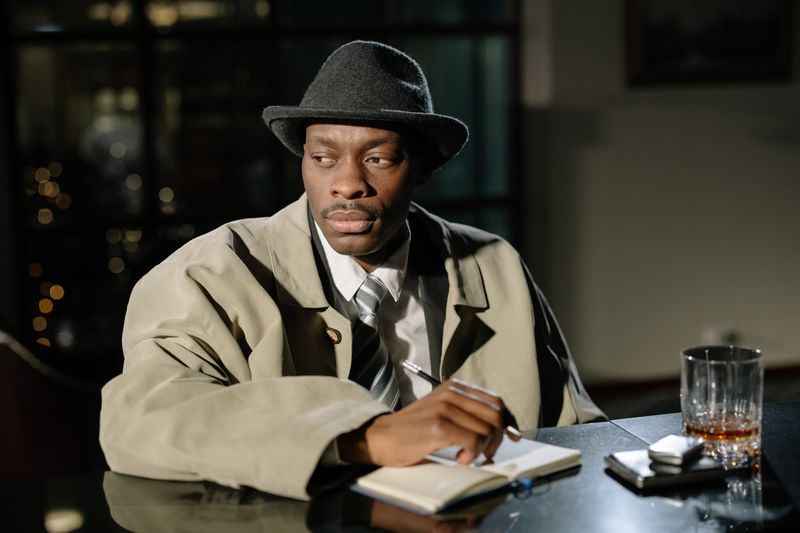The Fall of the House of Usher Series-Finale Recap: That’s So Verna
By Scott Meslow
Date: October 12, 2023
/cdn.vox-cdn.com/uploads/chorus_asset/file/23293718/ush_series_finale_re_f.jpg)
“And my soul from out that shadow that lies floating on the floor shall be lifted — nevermore!” — Edgar Allan Poe, “The Raven”
The Fall of the House of Usher has reached its long-awaited series finale, and the raw details of the devil’s bargain that sealed the fates of Roderick and Madeline are finally revealed. Throughout the show, we have witnessed the horror and tragedy that arises when the destinies of individuals, who were not yet born, are predetermined by a deal made by Roderick and Madeline years before the series began. In this final episode, the allegorical field on which The Fall of the House of Usher plays becomes clear.
The Allegory of Wealth and Consequences
In a pivotal moment, Verna offers Roderick and Madeline a deal on a fateful New Year’s Eve. She promises them unlimited money and power for the rest of their lives, free from legal consequences, under one condition — the Usher bloodline must be extinguished upon their deaths. This condition serves as a powerful metaphor for an entire generation that hoarded wealth, wreaked havoc on the environment and politics, and left the younger generation to grapple with the consequences. The series ultimately criticizes the Baby Boomers, provoking a satisfying response from millennial viewers like myself.
The question arises: did Verna truly have an influence, or were Roderick and Madeline already on an inexorable path towards power and destruction? History is replete with stories of wealthy individuals evading legal consequences without any magical intervention. Regardless of Verna’s precise role in the narrative, the adage that “bills come due” holds true. The tragedy lies in the fact that the deal also applies to Lenore, a symbol of innocence, as Verna takes her life.
Ultimate Consequences and Revenge
The series explores the consequences Roderick faces for his sins, leaving us to ponder if any one consequence can adequately fit the magnitude of the pain and death he has caused. The finale does not provide a definitive answer, as Madeline shows no remorse, and Roderick’s demise is overshadowed by the far-reaching harm he inflicted upon the world. It suggests that perhaps the best revenge is the pursuit of a righteous life. As the House of Usher crumbles and fortunes are redirected towards helping others, Dupin, one of the main characters, contemplates the true meaning of richness in terms of family and personal fulfillment.
The Fall of the House of Usher and Flanagan’s Spooky Legacy
With the conclusion of The Fall of the House of Usher, we bid farewell to Mike Flanagan’s notable run of spooky limited series for Netflix. As Flanagan now turns his attention to Amazon, it is worth considering where The Fall of the House of Usher stands alongside his previous works such as Hill House, Bly Manor, Midnight Mass, and the short-lived Midnight Club. Fans of Flanagan’s distinctive storytelling are encouraged to share their thoughts below.
Bumps in the Night
- We witness the recovery of Morrie and Juno after three years, suggesting a potential reunion between the two women who have survived the horrors caused by the Usher family.
- The mysterious allegiance between Arthur Pym and Roderick is left unresolved, leaving us to seek answers in The Narrative of Arthur Gordon Pym.
- Questions about the illusory nature of Verna’s bar and the presence of other patrons at the New Year’s Eve party remain unanswered.
- Madeline appears to have internalized Annabel’s criticism as she includes her judgment on Rufus’s tomb, highlighting her transformation and growth.
- The episode tantalizingly suggests that Roderick possesses intimate knowledge of Tamerlane’s bedroom preferences, revealing the peculiarities of the Usher family.
- Roderick’s agreement to the end of his bloodline, despite having two children, showcases the coldness and ruthlessness of his character.
- The show honestly confronts its own existence, exploring moral quandaries and raising the question of whether redirecting funds from the entertainment industry could address societal issues such as poverty and disease.
- The items left by Verna on the graves of the Usher family members symbolize their unique identities, with Lenore receiving a raven feather as the only instance of an unattached bequeathing.
- The revelation that the Pentagon spends $84 million annually on Viagra injects a touch of reality amidst the fantastical storyline.
- Verna concludes the story with one last recitation of Poe’s “Spirits of the Dead,” mirroring the dark themes and atmosphere of the series.
As The Fall of the House of Usher concludes, the legacy of Mike Flanagan’s Netflix series comes to an end. It is now time for fans to reflect on the place of House of Usher among Flanagan’s other notable works and contemplate the future of the horror genre in his capable hands.

<< photo by Samarth Singhai >>
The image is for illustrative purposes only and does not depict the actual situation.
You might want to read !
- The Fall of the House of Cards: Unraveling the Brutal Finale
- Behind the Blasts: Unraveling the Mystery of the Nord Stream Pipeline Attacks
- Israel Strikes Back: Responding to Syrian Shelling in Its Territory
- “Chiefs Outshine Broncos in Thursday Showdown: A Closer Look at Kansas City’s Victory”
- Examining the Implications of the Broncos’ Loss to the Chiefs: Will This Impact Denver’s Season Outlook?
- “Unveiling the Secrets: Exploring the Extended Version and Deleted Scenes of the ‘Riverdale’ Series Finale”
- Mayans M.C. Fans Dismayed by Controversial and Violent Series Finale
- “Exploring the Bittersweet Goodbye in the “Ted Lasso” Series Finale”
- LAPD Reinforces Security Measures in Response to Warning of ‘Global Day of Jihad’
- Is Putin’s Accusation of U.S. Inflaming the Middle East Justified?
“Inflaming the Middle East: Putin Slams U.S. Over Aircraft Carrier Deployment”




